#rhodes scholarship
Explore tagged Tumblr posts
Text
Rhodes Scholarship at the University of Oxford: Eligibility, Benefits, and Application Guide
Are you a dedicated student looking for financial assistance to pursue your postgraduate studies at Oxford University? The Rhodes Scholarship supports outstanding students like you in achieving academic and leadership excellence. What is the Rhodes Scholarship? The Rhodes Scholarship is a fully funded, full-time postgraduate award that enables talented young people from around the world to study…
0 notes
Text
UAE Students Win Prestigious Rhodes Scholarship for 2025
Two students from the UAE have been awarded the esteemed Rhodes Scholarship for 2025. This significant achievement highlights their academic excellence and potential to make impactful contributions to society. Read more about their journey and the significance of this prestigious honor.
0 notes
Text

0 notes
Text
previous reblog made me look up my compilation of quotes/passages that struck me when I read The God of Small Things, which I’d previously posted only on dreamwidth. below the cut, for enjoyment and curiosity (cn for mentions of gore and sexual harassment):
The nights are clear, but suffused with sloth and sullen expectation. But by early June the southwest monsoon breaks and there are three months of wind and water with short spells of sharp, glittering sunshine that thrilled children snatch to play with. The countryside turns an immodest green. Boundaries blur as tapioca fences take root and bloom. Brick walls turn moss green. Pepper vines snake up electric poles. Wild creepers burst through laterite banks and spill across flooded roads. Boats ply in the bazaars. And small fish appear in the puddles that fill the PWD potholes on the highways.
--
Yet Estha’s silence was never awkward. Never intrusive. Never noisy. It wasn’t an accusing, protesting silence as much as a sort of estivation, a dormancy, the psychological equivalent of what lungfish do to get themselves through the dry season.
Once the quietness arrived, it stayed and spread in Estha. It reached out of his head and enfolded him in its swampy arms. It rocked him to the rhythm of an ancient, fetal heartbeat. It sent its stealthy, suckered tentacles inching along the insides of his skull, hoovering the knolls and dells of his memory; dislodging old sentences, whisking them off the tip of his tongue.
---
Other days he walked down the road. Past the new, freshly baked, iced, Gulf-money houses built by nurses, masons, wire-benders and bank clerks, who worked hard and unhappily in faraway places. Past the resentful older houses [...] Each a tottering fiefdom with an epic of its own.
---- It is curious how sometimes the memory of death lives on for so much longer than the memory of the life that it purloined. Over the years, as the memory of Sophie Mol (the seeker of small wisdoms: Where do old birds go to die? Why don’t dead ones fall like stones from the sky? The harbinger of harsh reality: You’re both whole wogs and I’m a half one. The guru of gore: I’ve seen a man in an accident with his eyeball twinging on the end of a nerve, like a yo-yo) slowly faded, the Loss of Sophie Mol grew robust and alive. It was always there. Like a fruit in season.
--- She waged war on the weather. She tried to grow edelweiss and Chinese guava.
--- Perhaps it’s true that things can change in a day. That a few dozen hours can affect the outcome of whole lifetimes. And that when they do, those few dozen hours, like the salvaged remains of a burned house-the charred clock, the singed photograph, the scorched furniture- must be resurrected from the ruins and examined. Preserved. Accounted for.
--- His cremation was attended by all the boxers in Bengal. A congregation of mourners with lantern jaws and broken noses.
----
Ammu loved her children (of course), but their wide-eyed vulnerability and their willingness to love people who didn’t really love them exasperated her and sometimes made her want to hurt them-just as an education, a protection.
---
When she looked at herself in her wedding photographs, Ammu felt the woman that looked back at her was someone else. A foolish jeweled bride. Her silk sunset-colored sari shot with gold. Rings on every finger. White dots of sandalwood paste over her arched eyebrows. Looking at herself like this, Ammu’s soft mouth would twist into a small, bitter smile at the memory-not of the wedding itself so much as the fact that she had permitted herself to be so painstakingly decorated before being led to the gallows. It seemed so absurd. So futile.
other shorter lines I put in admittedly for much more superficial reasons like “hey! a pretty sentence!” (too short on time to put borders between different passages, sorry)
Pappachi’s Moth was held responsible for his black moods and sudden bouts of temper. Its pernicious ghost-gray, furry and with unusually dense dorsal tufts-haunted every house that he ever lived in. It tormented him and his children and his children’s children. They were a family of Anglophiles. Pointed in the wrong direction, trapped outside their own history and unable to retrace their steps-because their footprints had been swept away. When he was in this sort of mood, Chacko used his Reading Aloud voice. His room had a church-feeling. He didn’t care whether anyone was listening to him or not. And if they were, he didn’t care whether or not they had understood what he was saying. Ammu called them his Oxford Moods. Ammu said it was all hogwash. Just a case of a spoiled princeling playing Comrade. Comrade! An Oxford avatar of the old zamindar mentality-a landlord forcing his attentions on women who depended on him for their livelihood. Memory was that woman on the train. Insane in the way she sifted through dark things in a closet and emerged with the most unlikely ones-a fleeting look, a feeling. The smell of smoke. A windscreen wiper. A mother’s marble eyes. Quite sane in the way she left huge tracts of darkness veiled. Unremembered. She had wanted a smooth performance. A prize for her children in the Indo-British Behavior Competition. Shadows followed them. Silver jets in a blue church sky, like moths in a beam of light. They were presents for a seven-year-old; Rahel was nearly eleven. It was as though Ammu believed that if she refused to acknowledge the passage of time, if she willed it to stand still in the lives of her twins, it would. As though sheer willpower was enough to suspend her children’s childhoods until she could afford to have them living with her. Centuries telescoped into one evanescent moment. History was wrong-footed, caught off guard. Sloughed off like an old snakeskin. In its absence it left an aura, a palpable shimmering that was as plain to see as the water in a river or the sun in the sky. As plain to feel as the heat on a hot day, or the rug of a fish on a taut line. So obvious that no one noticed. A pair of actors trapped in a recondite play with no hint of plot or narrative. Stumbling through their parts, nursing someone else’s sorrow. Grieving someone else’s grief. [...] inside, map-breath’d ancestors with tough toe-nails whispered to the lizards on the wall. That History used the back verandah to negotiate its terms and collect its dues. […] on the day History picked to square its books, Estha would keep the receipt for the dues that Velutha paid. The glint of Ammu’s needle. The color of a ribbon. The weave of the cross-stitch counterpane. A door slowly breaking. Isolated things that didn’t mean anything. As though the intelligence that decodes life’s hidden patterns-that connects reflections to images, glints to light, weaves to fabrics, needles to thread, walls to rooms, love to fear to anger to remorse-was suddenly lost. He tells stories of the gods, but his yarn is spun from the ungodly, human heart. [...] Something to do with Death’s authority. Its terrible stillness. They were both men whom childhood had abandoned without a trace. Men without curiosity. Without doubt. Both in their own way truly, terrifyingly adult. They looked out at the world and never wondered how it worked, because they knew. They worked it. They were mechanics who serviced different parts of the same machine.
#personally? i liked the shade thrown at the oxford graduate uncle and the rhodes scholarship#and the last bit about men who had been abandoned by childhood#but also everything else#the god of small things#books#arundhati roy#meikuree talks
15 notes
·
View notes
Text
Full ride scholarships to prestigious universities should have an income ceiling to apply send tweet
#this is about the rhodes scholarship#the amount of rich mfers applying to full ride scholarships because its a CV booster#it defeats the whole purpose#of course you have more extracurriculars than me#you didnt have to WORK#im lucky to be supported by my parents but if you can afford the tuition#you shouldnt apply#this is the hill i will die on
3 notes
·
View notes
Text
yeah the state polls blog is driving me kind of insane because for like. every state my main association is "i've been there" or "i know someone from there"
#lifeblogs#i mean i think i also just haven't seen posts from the states i haven't been to/met people from#but like. my main association with rhode island is my freshman year roommate.#my main association with new mexico is when i went there and also various family connections.#my main association with iowa is family connections and someone from my college#oh it also helps that my college at one point was giving out scholarships to one person from each us state#so like. you knew who was from which state if you knew who had the scholarship#(i had the one for my state)#absolutely insane scholarship program by the way and yes they did go under
3 notes
·
View notes
Text
I do wonder if my uni will ever change the name of our “sackler library” lmao
#been controversial for years#also famously the most hated ugly library at my uni and there’s competition there so. sounds abt right i at least#I mean one of the college libraries was renamed bc it was named after a plantation owner so precedent is there#but Rhodes scholarship still going strong so 🤣
1 note
·
View note
Text
★★ ── ✐✐ introducing . . . fratboy!chris

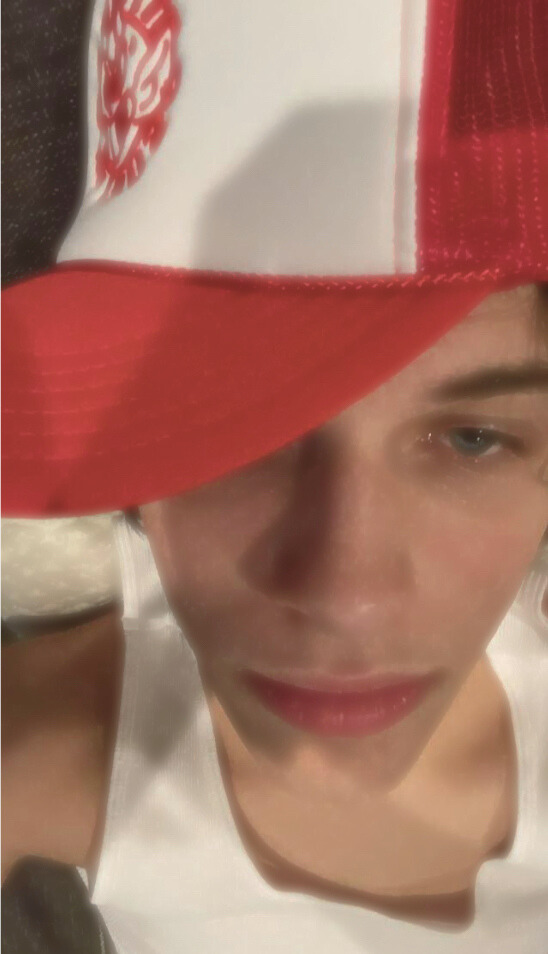







cₕᵣᵢₛ ── boston college junior. business major. beta theta phi. lacrosse scholarship. budweiser > coors. your best friend who fucks you on the low. lives for naps. an asshole with a soft spot for you. lil tecca's biggest fan. backwards caps and hoodies. vivienne westwood studs. slut who secretly loves cuddles. silly. emotionally guarded. campus weed seller. chronic class skipper. loves a nice ass. cool mint zyns.

♡♡ ── ༝༚༝༚༝༚༝༚ introducing . . . bsf!sorority!reader









ᥫ᭡ ── boston college junior. fashion major. delta phi. goody-two-shoes. a frat boy's dream girl. chris' best friend who fucks him on the low. bitchy but sweet. white fox sweatsuits. spiked punch. tate mcrae fan. party girl. confidence on point. spoiled rich girl. pink. slick backs and blowouts. slut for frat boys. smarty-pants. shopping addiction. rhode lippies. pinterest whore.

𝗮𝘂𝘁𝗵𝗼𝗿'𝘀 𝗻𝗼𝘁𝗲: i've had an obsession with these two for a long ass time so here we go hehe
inspiration: my baby @secretlocket <3
thank you for reading!! <3
tags 🏷️: @sturnobsessedwh0re , @idrk2292 , @mattsbrat , @ribbonlovergirl , @matthewsroses , @mattsdemi , @emely9274 , @frankoceanfanpage , @ifwdominicfike , @marrykisskilled , @strnilolover , @cayleeuhithinknott , @sturns-mermaid , @sophand4n4 , @sturnsrecord , @purpledragon222 , @faiyaz555 , @jocelyncsblog , @dvinesturn , @slut4chris888 , @chriss-slutt , @ilovedanielcaesar , @annsx03 , @snoopychris , @chrissweetheart , @slutformatt17 , @mattsturnii , @dominicfikeenthusiast , @mattsbratt333 , @ivysturnss , @tessasturns , @coquettechris , @courta13 , @sturniolo101 , @malsmind , @mattsleftball , @softhyunieeee , @whore4mattsturniolo , @tezzzzzzzz , @corspebridedelrey , @softhyunieeee , @sturn1oh0
@chrissturnsfav ™
#chrissturnsfav ᡣ𐭩ྀིྀིྀིྀིྀི#ᰔᩚ fratboy!chris x bsf!sorority!reader#chris sturniolo#christopher sturniolo#chris sturniolo smut#sturniolo smut#sturniolo triplets#chris sturniolo x reader#sturniolo triplets x reader#christopher sturniolo x reader#chris sturniolo x you#sturniolo x you#christopher sturniolo imagine#chris sturniolo imagine#chris sturniolo angst#chris sturniolo fanfic#chris sturniolo fluff#sturniolo triplets x you
241 notes
·
View notes
Text
i wanna be the one (that makes your day) (jessie fleming x ucla!reader)

the part two to i'll be your biggest fan (and you'll be mine)
word count: 1407 ish
rating: F for fluffy
title- best friend by rex orange county
a/n: again, unedited. part of my fic dump. not guaranteed spelling errors and plot hole free
----
it’s been exactly one month since you left california for oxford.
and in that month, you’ve felt the full weight of the transition.
the chill of the english weather, the constant rush of new information, and the distinct absence of a certain messy-haired canadian soccer player.
you’d been so determined to focus on your studies, on the prestigious rhodes scholarship that had brought you here, that the thought of jessie—of her—had taken a backseat.
but that didn’t mean she was far from your mind. because she wasn’t.
she never really was.
it’s just that, here, in oxford, it felt… different.
the landscape was so vast, so old, the buildings so steeped in history. everything felt so distant, so foreign.
it wasn’t the kind of place where a casual coffee date or library study sessions felt possible.
but that didn’t stop you from wondering if you might see her again.
and then, one crisp morning, while you were walking across radcliffe square, there she was.
jessie fleming, on a freaking london bus, looking effortlessly beautiful in a puffer jacket and jeans.
you freeze in place, breath hitching, your heart skipping.
you hadn’t expected to see her in england, let alone in oxford, and definitely not in this exact moment.
the last time you saw her, she was standing on the bleachers in sunny california, asking you out on a date.
you had kissed her. it was perfect.
and then she had flown back to london for her training with chelsea.
you still have the little text you sent her: "thinking of you. hope practice is going well. "
it was cute. she replied with something equally sweet.
and then you both agreed that you’d keep in touch.
you hadn’t realized how much you'd missed her until this very moment.
you panic for a second, unsure what to do.
should you wave?
run over?
act cool and pretend you weren’t feeling a little lightheaded?
before you can decide, jessie’s eyes meet yours.
they soften immediately, her lips curling into that familiar smile, and just like that, you’re moving without thinking.
she’s already walking toward you, her boots tapping along the stone path, her hands shoved deep into her pockets.
“hey, y/n,” she says, her voice warm.
“fancy seeing you here.”
your heart swells.
“jessie! what—what are you doing here?”
“i think that’s my question for you,” she teases, stopping in front of you.
“i was just in london for training and thought i’d visit oxford for a bit. nice to see you’ve finally joined the world of us english folk.”
you laugh, trying to mask the butterflies fluttering in your stomach.
“i didn’t know you’d be here. i’m just, you know, studying. trying to become a fancy oxford student or whatever.”
“fancy, huh?”
jessie quirks an eyebrow.
“you look more like you belong in california than in england.”
“yeah, well, i don’t know if i’ll ever get used to the rain. or the weather, for that matter,” you say with a small, self-deprecating chuckle.
“i like it,” she shrugs, grinning.
“it’s cozy. but maybe that’s because i grew up with it.”
“right,” you mutter, glancing down at your boots and feeling suddenly nervous again.
“so what’s the plan? are you here for long?”
“nah, just a couple of days,” she says, looking around with interest.
“but i could always stay longer. what about you? got any plans for the day?”
you hesitate, thoughts running wild. “um, not really. just… studying. you know, the usual.”
jessie smiles knowingly, and before you can blink, she’s offering her arm to you.
“well, if you’re not doing anything, you want to come grab a coffee with me?”
you try to keep your cool.
“a coffee?” you repeat, almost disbelieving.
“as in, just us? hanging out?”
jessie tilts her head, amusement dancing in her eyes. “yeah, just us. no big deal.”
you’re pretty sure your heart is about to burst out of your chest, but you manage to nod, trying to hide the giddiness creeping up.
“sure, i’d love to.”
and so, the two of you stroll through the cobbled streets of oxford, coffee cups in hand, casually talking about everything and nothing.
the conversation flows effortlessly, like you’ve known each other for years, like time and space hadn’t really interrupted your connection.
“so how’s chelsea?” you ask, as you both take a seat on one of the benches overlooking the river.
“it’s been great,” she replies, looking genuinely happy.
“lots of training, a few matches here and there. and you? how’s oxford? is it everything you thought it’d be?”
you think for a moment.
“yeah. and no. i mean, it’s exactly what i expected academically, but i didn’t know how lonely it would feel sometimes. like, everyone’s so driven, and it’s kind of… overwhelming.”
jessie nods, her gaze softening.
“i get that. being away from home is hard, but you’re doing it, right? you’ve got this.”
you smile, warmed by her words.
“thanks, jessie. i appreciate that.”
“of course,” she replies, her voice gentle.
“besides, we’ve both got big things going on, right? you with the rhodes, me with the team... we’re kind of a power couple, if you think about it.”
you laugh, the sound coming out more nervous than you intend.
“power couple? is that what we are?”
jessie’s grin widens.
“why not?”
and for the rest of the afternoon, you both walk around oxford, talking about life, about what you miss, about your plans for the future.
the conversation flows with ease, like you’ve always been in each other’s orbit, like nothing has really changed.
by the time the sun begins to set, painting the sky in shades of pink and purple, jessie turns to you, her smile softening.
“i’m really glad we’re doing this,” she says quietly. “i’ve missed you.”
you swallow hard, your chest tightening.
“i’ve missed you too.”
“i mean it,” she continues.
“i know we’re both busy, and i know this whole long-distance thing isn’t easy, but... i want to see you more. when you’re free, come to london. i’ll show you around.”
the warmth in her words melts you completely.
“i’d love that,” you whisper. “i’d really love that.”
“good,” she says with a wink.
“because i’ve already got a few ideas for our next date.”
you laugh, your heart fluttering.
“a date, huh?”
jessie shrugs, looking casually cool.
“we did kind of kiss last time i checked, so i think it counts.”
you roll your eyes, but you’re grinning.
“you’re impossible, you know that?”
“yeah, i know,” she says with a laugh. “but you like me anyway.”
you shake your head, a playful smile on your lips.
“don’t get too cocky.”
“i’ll try,” she says, her eyes twinkling.
the sun dips below the horizon, and the night air grows cooler, but there’s something incredibly comforting about sitting here with jessie, knowing that the two of you have this connection that just keeps growing stronger.
~~
over the next few weeks, you and jessie stay in touch.
the long-distance thing isn’t easy, but it’s working.
you FaceTime when you can, send each other little messages of encouragement.
she’s training for her upcoming season with chelsea, and you’re buried in your studies, but the moments you do find to talk are the highlights of your day.
it’s strange, though, to think about how your life has shifted since that first meeting in the library back at ucla.
you’ve come so far, both of you, and yet somehow, despite the distance, you still feel that pull to her.
that connection you can’t quite explain, but you know is real.
jessie visits oxford a few more times, and each time feels like a new chapter in your relationship.
you go out for coffee, explore the city, and sneak in quiet moments in between your busy schedules.
with each visit, your feelings for her grow stronger, and you begin to wonder if this could really work—this thing between you two, despite everything.
one night, after a long week of work, you find yourself at your desk, scrolling through your messages when you see a new one from jessie.
"thinking about you. when’s the next time i get to see you? "
your heart skips.
you reply quickly: "soon. i’ll make it happen. i miss you."
she responds almost instantly: "me too. see you soon, love."
you grin, your heart swelling.
this? this was just the beginning.
#jessie fleming x reader#jessie fleming imagine#woso imagines#jessie fleming#canwnt imagine#canwnt x reader#the only chelsea player i will ever like
59 notes
·
View notes
Text

he's written mine on my upper thigh only in my mind on ao3 (oneshot, 30k)
Jake is absolutely not going to spend his summer vacation at his family's beach house alone with his ex boyfriend and said ex's new boyfriend. Bradley needs a place to stay for the summer. Faking a relationship solves both their problems, until it creates a new problem when they start to fall for their own ruse. Unless it ends up not being a problem at all.
Or
Jake's a trust fund, tennis star at Vanderbilt. Bradley's an orphaned baseball star on scholarship. Their worlds are very different, but all they need is three months in Rhode Island to build a new one together.
161 notes
·
View notes
Note
it's so absurd to me how little taylor actually gives, given her net worth. i understand that's composed of property and other assets, not just literal cash, but... do you need aaaaallllllll of those properties? the cornelia street rental cost 38,000 a month... that's a year's worth of somebody's college tuition of they're lucky. does she really need to renovate and add on to her rhode island mansion for 1.8 million dollars? that could easily buy 4-5 struggling families houses at around 300k each... or it could buy her a new bedroom, a few more bathrooms, and a bigger kitchen.
doesn't it feel better to give and see people be happy? if she likes being worshipped so much, this would be such an easy way to get on people's good sides.
im sorry... $38K A MONTH???? that is actually more than my entire college education cost (ignoring scholarships), but that's been a minute. this is exactly why it's sooooo weird when people call her the 'only ethical billionaire' as if wealth hoarding stops being wealth hoarding if you do enough donating in a piecemeal way. it literally doesn't, it just means you are so astronomically wealthy that giving what seems like fairly good chunks away doesn't even touch the vast accumulation of your assets.
37 notes
·
View notes
Text
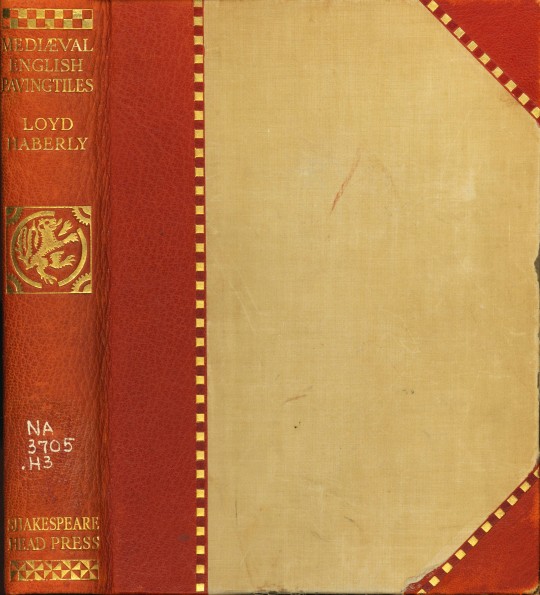
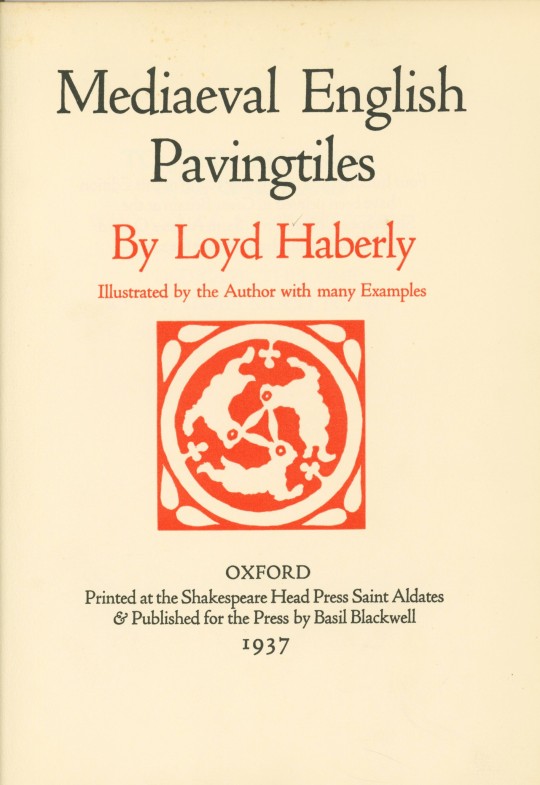



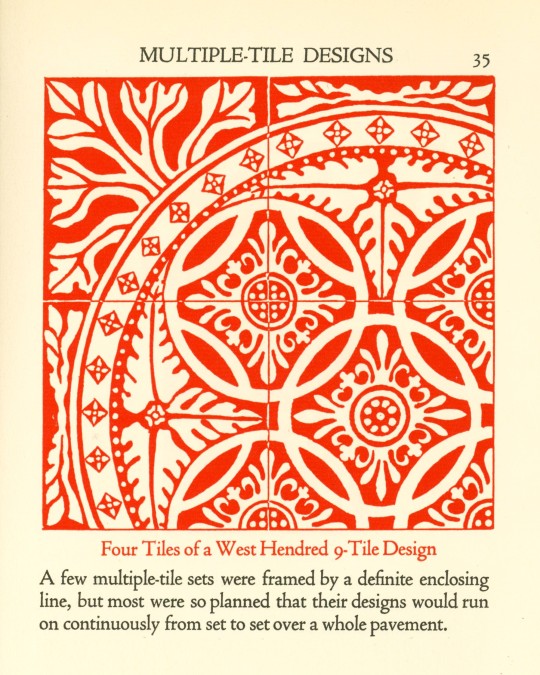
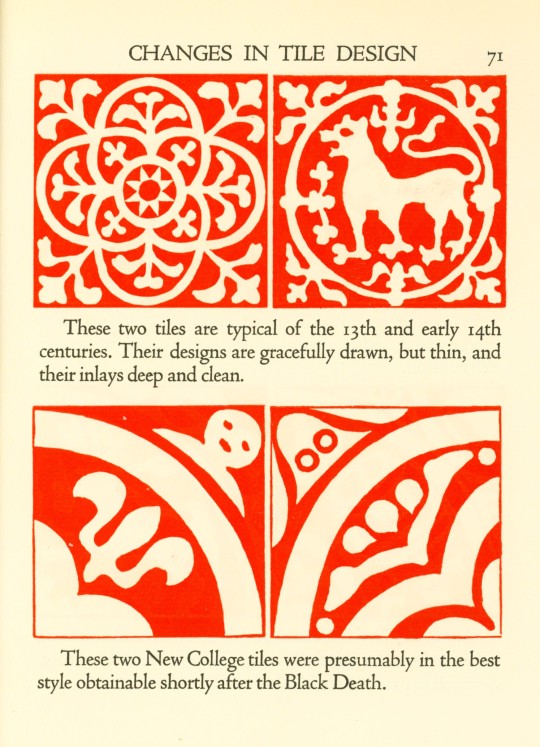


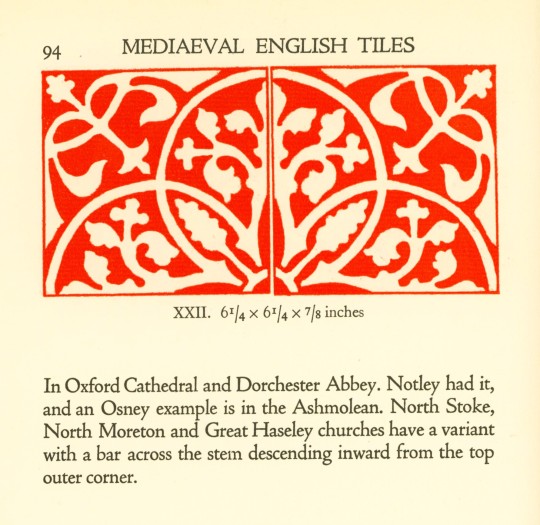
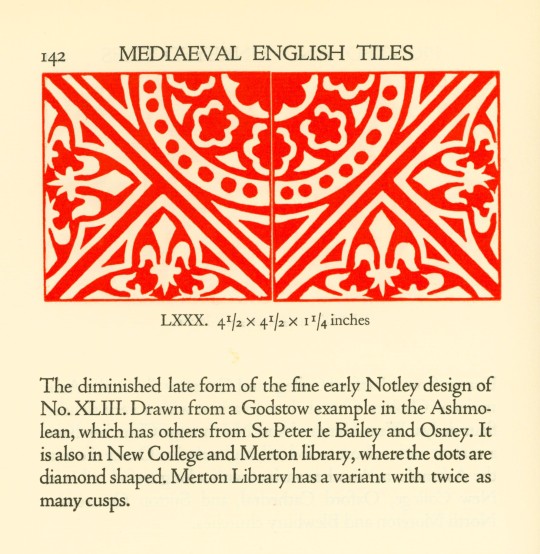
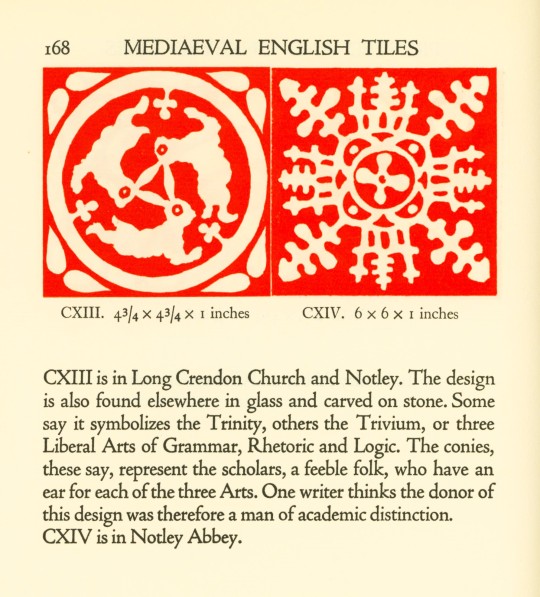
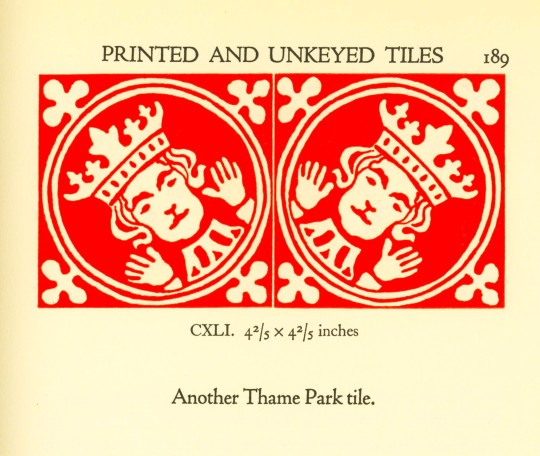
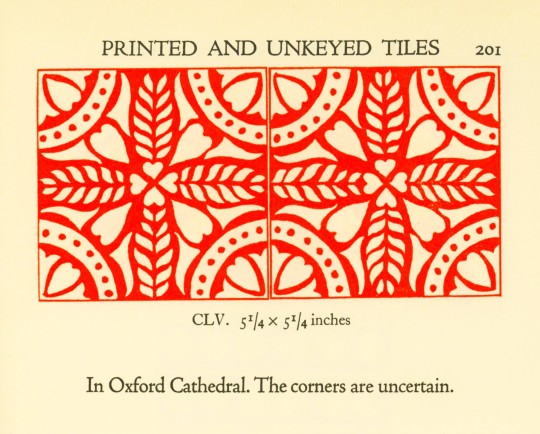
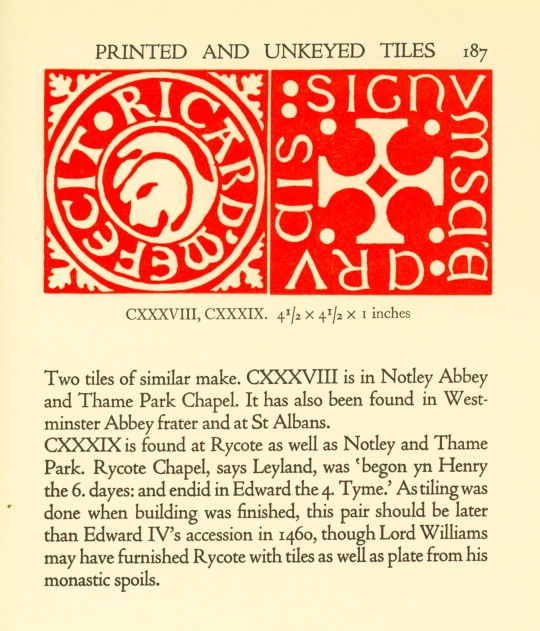
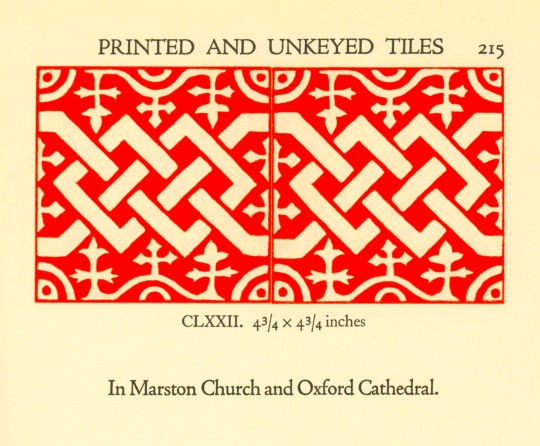
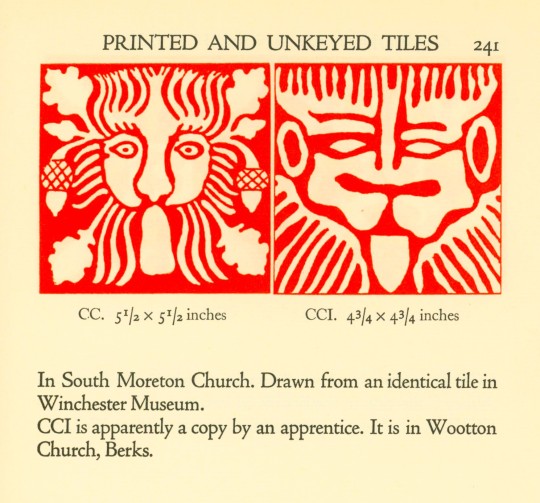
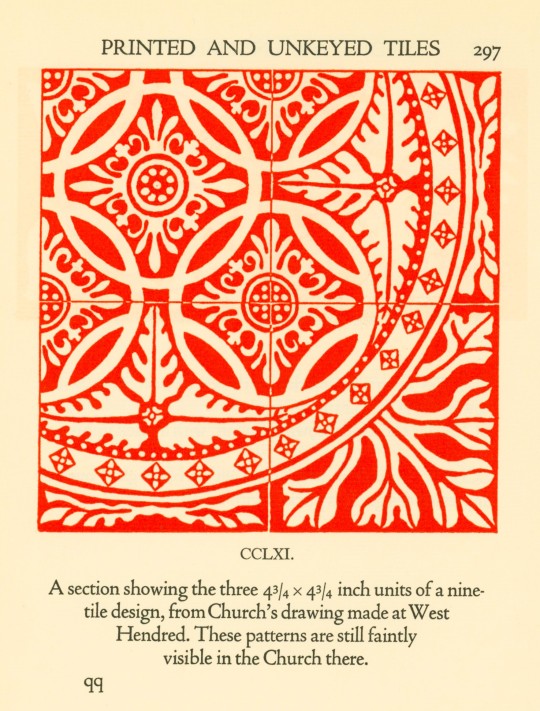
Wood Engraving Wednesday
LOYD HABERLY
American wood engraver, type designer, and letterpress printer Loyd Haberly (1896-1981), while educated in the U.S., learned the craft of fine press printing in England after receiving a Rhodes Scholarship to read law at Oxford. He founded his Seven Acres Press there and did a short stint as controller of the Gregynog Press in the early 1930s. He continued to work and print in England until the late 1930s, studying and excavating medieval English paving tiles and picking up a law degree at Oxford. He returned to the U.S. to pursue an academic career, eventually becoming Dean of Liberal Arts at Fairleigh Dickinson University. He continued his fine press activities in America from 1940 to 1976.
One the last books he produced while in England was this work based on his research on paving tiles, Medieval English Pavingtiles, printed in an edition of 425 copies with his original wood engravings at the Shakespeare Head Press and published for the press by Basil Blackwell in 1937.
View other posts with work by Loyd Haberly.
View more posts with wood engravings!
#Wood Engraving Wednesday#wood engravings#wood engravers#Loyd Haberly#Medieval English Pavingtiles#paving tiles#Shakespeare Head Press#Basil Blackwell
229 notes
·
View notes
Text

Hello, spamming every platform with the B&N sale because hey look, my weird, queer dragon books got fancy exclusive editions with sprayed edges (feathers and clouds!)! They're currently chilling in the top 200 on the website just behind SJM, which is surreal. These both come out March 4th, so in just under a month! Emberclaw is a brand-new release, the (somewhat delayed) follow-up to Dragonfall, and I was pretty excited that B&N decided to give the first book a glow up, too. It had a standard hardcover and I know people really like matching sets.
Pantomime comes out in September and is my revised and revamped preferred text of my debut, which first came out all the way back in 2013. Thanks to Dragonfall taking off in paperback, I got the chance to go back to R.H. Ragona's Circus of Magic, which is pretty cool. This was the first YA book with an intersex protagonist in any genre, as far as I can tell, though Micah has now been aged up to 17/18 and it is slightly more adult in this re-release.
A month before Dragonfall's launch the first time, I was a freaking wreck. This time, I am anxious, not least because releasing a trans book in today's climate is, well...it's something. I fly to the US at the end of the month for my little tour to New York, Rhode Island, and Boston, and who knows what will be going on in the country by that point. But there's lots to look forward to, and I've gotten really nice messages from people who love the series. Links if you'd like some pretty copies for 25% off (the code is PREORDER25), and it ends Feb 7th, 2025. Any help spreading the word would be great. You can also pre-order from your favourite indie store, too, if you prefer, or request from your local library.
Link to Dragonfall Exclusive Hardcover
"In Dragonfall, Lam has forged a fresh and intricate world, a smoldering romance, and a fire-new take on dragons."—Samantha Shannon, New York Times-bestselling author of The Priory of the Orange Tree
Long ago, humans betrayed dragons, stealing their magic and banishing them to a dying world. Centuries later, their descendants worship dragons as gods. But the "gods" remember, and they do not forgive.
Thief Arcady scrapes a living on the streets of Vatra. Desperate, Arcady steals a powerful artifact from the bones of the Plaguebringer, the most hated person in Lumet history. Only Arcady knows the artifact's magic holds the key to a new life among the nobles at court and a chance for revenge.
The spell connects to Everen, the last male dragon foretold to save his kind, dragging him through the Veil. Disguised as a human, Everen soon learns that to regain his true power and form and fulfil his destiny, he only needs to convince one little thief to trust him enough to bond completely—body, mind, and soul—and then kill them.
Yet the closer the two become, the greater the risk both their worlds will shatter.
Link to Emberclaw Exclusive Hardcover
"What you will find here may be exactly what you love in fantasy: Dragonfall is an intriguing blend of magic, a thief, trickery, and an unexpected dragon." —Robin Hobb, New York Times-bestselling author of Fool’s Assassin
Arcady faces their greatest heist yet: posing as a noble student at the arcane University of Vatra. When the University announces the reinstatement of archaic trials of magic, the ever-penniless Arcady seizes the chance. If they win, they not only prove their worth, but the scholarship will give them more time to unlock secrets and reveal, once and for all, that their grandsire was not the Plaguebringer. Yet grief still leaves Arcady broken, and when they close their eyes, they dream of a certain dragon.
Everen, once the hope of dragons, is now hated by his kind. When he is eventually released from his prison, the Queen is clear: while he may help protect the island from wraith attacks, he is no longer a prince of the realm. As he struggles to find his place in Vere Celene, visions of the past, the future, and tantalizing glimpses of Arcady still haunt him. If he steers the wrong path through fate’s storm, he may never be able to create a future where both humans and dragons live in harmony.
Arcady soon realizes that to survive the rising threats from both their old life and their new one, they must use every trick at their disposal—even magic stolen from a dragon they thought dead. And as time runs out before an ancient danger awakens, Everen must fight his way back to Arcady, earn their forgiveness, and learn what it truly means to be an Emberclaw.
Link to Pantomime Paperback (dunno yet if it's getting an exclusive edition--fingers crossed!)
"Pantomime is a fantastical, richly drawn, poignant take on a classic coming-of-age story . . . a vibrant tale told with surety and grace" — Leigh Bardugo
In a land of lost wonders, the past is stirring once more . . .
Micah runs away from a debutante’s life at home and joins the circus, harboring two secrets–one: he was born between male and female, and two: he may have powers last seen in mysterious beings from an almost-forgotten age.
Micah discovers the joy of flight as an aerialist, courting his trapeze partner, Aenea, and confiding in the mysterious white clown, Drystan. He finally feels free. But the circus has a dark side, and Micah’s past isn’t done with him.
Meanwhile, the strange 'ghost' of a woman with damselfly wings whispers to Micah that only he can help magic return to the realm, and he fears she may be right…
Micah has much to learn, and he must do it quickly—before his past and future collide, with catastrophic consequences.
27 notes
·
View notes
Text

--------------------------------------------------
Amazing how uncritically modern leftists, who won't even say "Rhodes Scholar," will leap to defend 150-year-old white Englishmen if they seem to be good on Palestine for ten seconds.
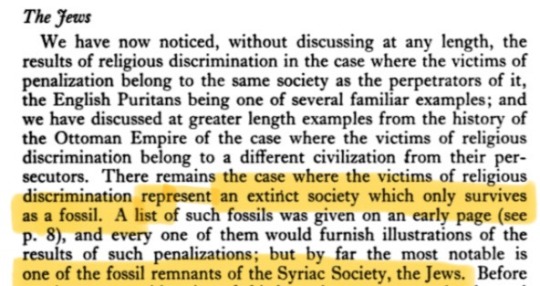
Fucking ARNOLD TOYNBEE. Really!
Toynbee uses the term "Judaic" to describe episodes of "extreme brutality," even where Jews themselves were not involved, as in the Gothic persecution of the Christians. More generally, throughout the first eight volumes of his civilization series, Toynbee often refers to the Jewish people as a "fossil remnant," implying that Judaism was defined by its "fanaticism," its "provincialism," and its "exclusivity," whose value derived solely from its role as a seedbed for the superior civilization and moral code of Christianity.
By characterizing Judaism as a morally primitive belief-system based on the idea of Jews as a "master race," and then asserting that Jews' claim to Israel is based on this premise, Toynbee figures Zionism as "kindred to Nazism." On the other hand, Toynbee argues that by failing to accept their fate as a diaspora community and trying instead to replace the "traditional Jewish hope of an eventual Restoration of Israel to Palestine on God's initiative through the agency of a divinely inspired Messiah," Zionist Jews have the same "impious" relationship to their religion as Communists do to Christianity. Having thus equated Zionism with both Nazism and Communism, Toynbee asserts:
On the Day of Judgement, the gravest crime standing to the German National Socialists' account might be, not that they had exterminated a majority of the Western Jews, but that they had caused the surviving remnant of Jewry to stumble.
What was delightful was that an actual Jew made this colonizing motherfucker eat his words!
Toynbee explained that he did not intend to statistically equate the actions of the Nazis with those of Israel’s founders, but rather simply to draw a moral comparison: that individual massacres committed by Israeli forces in 1948 were no different than those perpetrated by the Germans against the Jews. “If I murder one man, that makes me a murderer,” he observed. “I don’t have to reach the thousand mark or the million mark to be a murderer.”
Herzog pounced on this point, turning Toynbee’s own scholarship against him. “Now, Professor, in volume four, page 128F, of your Study of History you say, ‘In the history of man’s attempt at civilization hitherto, there has never been any society whose progress and civilization has gone so far that in times of revolution or war, its members could be relied upon not to commit atrocities,’ ” Herzog recited. He then listed all the nations Toynbee himself implicated in this charge: the Germans in Belgium in 1914, the British in Ireland in 1920, the French in Syria, and many others throughout history—including, of course, the Nazis.
Herzog then added one group that Toynbee had omitted: “Do you agree that there were also Arab massacres of Jewish civilians?” Herzog made reference to such cases, asking, “Were these also in the category of Nazi atrocities? And if so, why don’t you say that both sides did things in such a category? Why do you choose us? Why do you single us out? Why don’t you write of Britain and of almost every country in the world according to your own definition?”
After several minutes of such questioning, Toynbee conceded the point. “I agree that most societies have committed atrocities, but I do not think that condones atrocities,” he said. “I agree with you on that,” Herzog quickly responded. “But do you agree that this comparison can be applied on the universal level to any country which in war its soldiers have committed atrocities against civilians?” Toynbee had to concur: “Yes, atrocities are atrocities and murder is murder, whoever commits it.” Herzog asked if Toynbee would similarly stigmatize “Arab atrocities against Jewish civilian populations,” and those committed by the United States. “Of course,” the professor replied.
With that admission, Herzog essentially disarmed the historian. After all, if every nation had behaved like the Nazis, then the charge was divested of moral meaning. “In other words,” Herzog concluded, “the Nazi pall lies across the world, before the Nazis came … and after they have gone.” Jews, then, were no more prone to immoral conduct than any other people, and Israel no more and no less guilty than any other modern state.
@laast-in-tranz-lay-shn
#leftist antisemitism#arnold toynbee#israel#palestine#nice to see an anti-zionist say “there is such a thing as too far”#but there are always others who say “no there isn't”
148 notes
·
View notes
Text






Introducing Avery Rhodes & Luca Salazar in "Wicked Game" [a "Winchester College" story]
"Between allegations of inappropriate relations between students and members of staff and the Lucien Belmont sextape scandal, this sad story of sex, lies and blackmail is just the latest in a long list of tales about a school whose integrity and good name has long since been sacrificed on the altar of nepotism by the hedonistic offspring of its biggest donors..." [The Manchester Daily, December 2024 - written by Beatrice Worth]
Dirt poor, yet charming artist Luca Salazar, who claws his way through artschool on scholarships and charity, finds himself at the mercy of ruthless socialite Pippa Harrington, who intends to use him against sweet, innocent Avery Rhodes - her rival in the race for a coveted internship.
This is now a Cruel Intentions (adjacent) fic - which is actually fitting, because some of it was definitely inspired by a story my friend and I wrote some twenty-something years ago, when we were obsessed with the movie 🖤
tagged: @bravelittleflower @mabonetsamhain @mystic-scripture @sgtbuckyybarnes @thatmagickjuju
@akabluekat @arrthurpendragon @asirensrage @astarionbae @auxiliarydetective @bibaybe @bisexualterror @cas-verse @curious-kittens-ocs @darknightfrombeyond @darkwolf76 @drbobbimorse @eddiemunscns @emilykaldwen @fyoriginalstories @fyeahocsofcolor @foxesandmagic @harleyquinnzelz @if-you-onlyknew @jamezvaldes @jewishbarbies @juliaswickcrs @katiekinswrites @kingsmakers @koiwrites @margoshansons @oneirataxia-girl @susiesamurai @stachedocs
#cruelintentionsedit#cruel intentions fic#cruel intentions#nanowrimo#original story#writblr#avery rhodes#luca salazar#wicked game#my ocs#my graphics
27 notes
·
View notes
Note
Random question inspired by something in the Discord! Did Georgie play for the U17 and U18 USNTDP teams and billet in Michigan for two years? Or did he just do NTDP summer programs? And if the latter, where did he play in high school?
He was there for the summer programs (and come tournament time), but during the season he played for a school in Rhode Island that has one of the Top 20 U18 teams in the country (this school (ranked 11th!) does exist, and I'm sorry for never portraying Robbie giving Georgie endless shit for going to a school in a place called Woonsocket, because you know he'd be intolerable about it).
It's a private school but, as you can imagine, he was good enough to receive a full scholarship (of note that it's specifically a private Catholic school, same as Robbie's, though unlike Robbie's, it was co-ed.) It was also close enough for him to commute every day, so he could still live at home. Which was what he wanted, but also, he was fully aware, really the only way his family was going to be able to swing things.
There was a pretty tacit understanding if he was no longer skilled enough to be getting those 'we're going to find a way to get you on our team' offers (the scholarship and transportation, financial assistance from the USNTDP, a full ride to BU before he was even drafted) that he couldn't continue to play at that level.
But, obviously, a good enough player to be drafted 10th overall, even as a positional pick rather than best player available (there were forwards still available ranked higher, but Cleveland really needed D) -- people are happy to pull whatever strings needed if that means he's playing for their team.
(Dicky and Will both go to the same school, partly as a sort of favour, but they're both talented athletes in their own rights, and play for the school teams).
36 notes
·
View notes